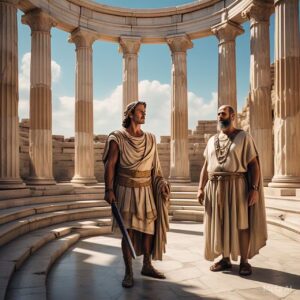Origin of Drama – Drama Meaning
Introduction to Classical Drama: Definition, Origin, and Importance
Definition of Classical Drama
Classical drama refers to the early forms of theater that developed in ancient Greece and Rome . It follows a structured form with specific rules about plot, characters, and themes. Classical drama mainly includes tragedy and comedy, which explore serious moral lessons, human nature, and social issues. These plays were performed in large theaters and had a strong cultural and religious influence. Today, classical drama is considered the foundation of modern theater and literature.
Origin of Classical Drama
The origins of classical drama can be traced back to ancient Greece in the 5th century BCE. It developed from religious festivals held in honor of Dionysus, the Greek god of wine and fertility. During these festivals, performers sang hymns called dithyrambs, which later evolved into full theatrical performances. Over time, Greek playwrights introduced actors, dialogue, and dramatic storytelling.
There were three major types of Greek drama:
- Tragedy – Serious plays that focused on fate, gods, and human suffering. The most famous tragedians were Aeschylus, Sophocles, and Euripides.
- Comedy – Humorous plays that mocked society and politics. Aristophanes was the most well-known comic playwright.
- Satyr Plays – Short, humorous plays performed between tragic plays to lighten the mood.
Greek plays were performed in large open-air theaters, with actors wearing masks and costumes to represent different characters. The chorus played a crucial role in narrating the story and expressing the emotions of the characters.

Roman drama emerged around the 3rd century BCE when Rome conquered Greece and adapted Greek theater. However, Roman plays were more focused on entertainment rather than religious themes. Plautus and Terence were famous for their comedies, while Seneca wrote tragic plays that influenced later European drama. Roman theaters were grand structures with more elaborate stage designs compared to Greek theaters.
Importance of Classical Drama
Classical drama is significant because it laid the foundation for modern storytelling, literature, and theater. Many of its techniques and themes are still used in plays, films, and television today. Some of its major contributions include:
- Plot structure – Classical drama introduced the idea of dividing a play into acts and scenes.
- Character development – It explored complex human emotions, motivations, and tragic flaws.
- Dramatic themes – Topics such as fate, justice, morality, and power remain central to storytelling today.
Classical drama also influenced famous playwrights such as William Shakespeare, who borrowed themes, character types, and plot structures from Greek and Roman plays. Even modern movies and literature follow classical drama’s methods of storytelling.
Moreover, classical drama provides insight into ancient cultures, values, and beliefs. It reflects the concerns of ancient societies and helps us understand their philosophies and traditions. In conclusion, classical drama is a vital part of world literature and history. Originating in ancient Greece and evolving in Rome, it shaped the way stories are told today. Its influence on modern drama, literature, and philosophy continues to be felt, proving its timeless importance.
#drama meaning #drama meaning #drama meaning #drama meaning #drama meaning #drama meaning #drama meaning #drama meaning #drama meaning #drama meaning #drama meaning #drama meaning
Examination Questions
- How did religious festivals contribute to the development of Greek drama?
- What are the three types of Greek drama, and how do they differ from one another?
- How did Roman drama differ from Greek drama in terms of focus and style?
- Why is classical drama still considered important in modern times?
- How did classical drama evolve from religious rituals into a structured theatrical tradition in Greece and Rome?
- Evaluate the lasting impact of classical drama on modern storytelling, literature, and culture.
Read More
Aeschylus’ Agamemnon and Sophocles’ Oedipus Rex
Plot Construction in Pride and Prejudice
Introduction to Fiction and Non Fiction
Of Death — Francis Bacon (Text)
Of Truth Critical Analysis by Sir Francis Bacon
Of Truth by Francis Bacon Summary
Visit Us on our Facebook Page:






